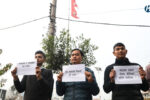Since the beginning of the Covid-19 pandemic, most countries have classified their countries into three categories: Red, Green, and Orange, based on the risk they provide to other countries.
The green zone indicates that a country is relatively safe to visit, the orange zone indicates that a country is very unsafe and riskier to visit, and the red zone indicates that a country is extremely risky to visit.
This has now become a standard procedure, and countries that follow it frequently filter the list based on the number of ongoing cases in each county.
Starting at 4 a.m. on Monday, October 4, 2021, the rules for international travel to the United Kingdom (UK) will shift from the old red, amber, and green traffic light system to a single red list of nations.
The requirements for travel to countries and territories not on the red list will be determined by an individual’s vaccination status.
Despite the fact that the number of daily cases in Nepal is dropping at a quick speed, Nepal remains on the revised red list of countries maintained by the UK.
It should be noted that the South Asian countries Bangladesh, Sri Lanka, and India have all been removed off the red list since their rates of Covid-19 infection are decreasing. Nepal, on the other hand, is still on the red list, in spite of the similar decreasing infection rate.
The following are the Covid-19 cases from Bangladesh, Sri Lanka, and Nepal, at 5-day intervals, beginning September 1st:

We can notice that Nepal has fewer active daily cases than Bangladesh and Sri Lanka. According to the Ministry of Health and Population of Nepal, only 7% of positive cases on PCR and Antigen tests are found, which is minimal.
While the UK’s cases are more in number than Nepal’s, it makes no sense to restrict Nepal from international travel.
What’s more astonishing is that, as of September 21, 2021, Bangladesh had fully vaccinated only 9.1 percent of its population, whereas Nepal had fully vaccinated 19.5 percent of its population.
Regardless of this reality, restricting and rescinding Nepal’s entry into international travel is clearly unjust – hence are there other factors?
Or is it a lapse in Nepal’s diplomacy with the United Kingdom? These questions have aroused in the public domain. It is surprising, given the Nepali counterpart’s consistent silence on such a subject.
As a result of Nepal’s inclusion on the red list, Nepali residents traveling to the UK for education, work, or essential services would face delays, and procedures will prolong, placing a financial burden on top of the mandatory quarantine requirements.
A similar problem is faced by India. Individuals who have been vaccinated with Covishield have been classified in the category of “unvaccinated” as a result of the UK’s new Covid-19 travel guidelines.
On the other hand, it has relaxed the criteria for those who have received two doses of the Oxford-AstraZeneca vaccine, which is the identical version of the vaccine developed in India by the Pune-based Serum Institute of India. This raises another question on where to draw the red line since Covishield is an approved vaccine by WHO.
According to the report of The Indian Express published on September 21, 2021, the issue of prejudice against Indian visitors to the UK is being addressed at the diplomatic level.
According to reports, External Affairs Minister Jaishankar will meet with newly-appointed British Foreign Secretary Liz Truss. It is also learned that the two countries’ health agencies are in contact.
The attempt made by India to resolve the matter diplomatically may be a useful clue for Nepali diplomats. However, the Nepali government has said nothing regarding Nepal’s unfair inclusion in the red zone.
In this scenario, Nepal has various legitimate grounds to speak with the United Kingdom and negotiate a revision of the red list, and perhaps moving to the amber zone appears more logical.
As a result of Nepal’s inclusion on the red list, Nepali residents traveling to the UK for education, work, or essential services would face delays, and procedures will prolong, placing a financial burden on top of the mandatory quarantine requirements.
Now is the time for the government to demonstrate its diplomatic capabilities, hold bilateral negotiations, and address this situation as soon as possible—this should be possible due to Nepal’s cordial relations and a longtime friendship with UK.









Comment